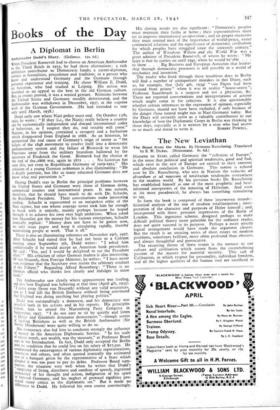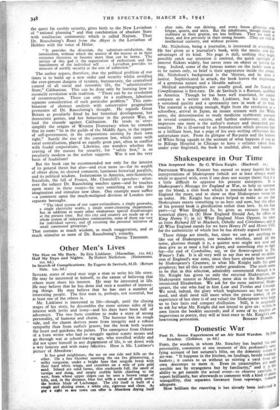The New Leviathan
MADAME DE STAEL called Germany the reflexion of Europe," in the sense that political and spiritual tendencies, good and bad, which exist in the rest of Europe are carried to their extreme and absolute conclusion in Germany. This notion is echoed now by Dr. Rauschning, who sees in Nazism the reductio ad absurdum et ad nauseam of totalitarian tendencies everywhere in the modern world. By his previous books Dr. Rauschning has established himself as one of the most prophetic and best- informed interpreters of the meaning of Hitlerism. And even at his most paradoxical, he always has something stimulating to say.
In form the book is composed of three interwoven strands : historical analysis of the rise of modem totalitarianism ; inter- pretation of the character and purposes of Hitler himself ; and, interspersed with these; personal impressions of the Battle of London. This ingenious scheme, designed perhaps to make difficult political theory more palatable for the ordinary reader, does not quite succeed in its purpose. Perhaps a more strictly logical arrangement would have made the argument clearer. But the result is an amazing series of short essays on modern problems, sometimes brilliant, more often profound than obscure, and always thoughtful and provocative.
The recurring theme of these essays is the menace to our culture and civilisation which comes from the overwhelming passion of the masses for material security. This cult of Calibanism, in which respect for personality, individual freedom, and all the higher qualities of the human soul are sacrificed in the quest fat earthly security, gives birth to the New Leviathan of " rational planning " and that combination of absolute State with totalitarian community which is called Nazism. Thus Dr. Rauschning's Beast from the Abyss is the Leviathan of Hobbes with the voice of Hitler.
" It provides the diversion, the substitute-satisfaction, the intoxication, without which the anxiety of the masses as to their existence threatens to become more than can be borne. The service of this god is the organisation of enthusiasm and the banishment of the individual self. . . . Leviathan provides its measure of earthly security at the cost of subjection."
The author argues, therefore, that the political problem of our times is to build up a new order and security whilst avoiding the ever-present dangers of tyranny, bureaucracy, the centralised control of all social and economic life, the " administrative State," Calibanism. This can be done only by learning how to reconcile revolution with tradition. " There can be no revolution of reconstruction. There can only be a stubborn, laborious separate consideration of each particular problem." This com- bination of abstract analysis with conservative pragmatism permeates all Dr. Rauschning's thought. He regards Great Britain as peculiarly fitted by her historical development, her democratic genius, and her behaviour in the present War, to lead the crusade against Calibanism. He tends to ' over- simplify the origins of Western Democracy when he remarks that its roots " lie in the guilds of the Middle Ages, in the organs of self-government, in the corporations existinr, by their own right." Surely the rise of the common law, which came with
royal centralisation, played an equally great part, often in conflict with feudal corporations. Likewise, one wonders whether the craving of the masses for security, for " safety first," is so peculiarly modern as the author suggests. Was it not the very basis of feudalism?
But the book can be recommended not only for the interest of its general thesis but also—and evzn more so—for its wealth of obiter dicta, its shrewd comment, luminous historical parallels, and its political wisdom. Isolationism in America, anti-Semitism, Socialism, the fall of France, Mr. Churchill's speeches : what- ever the subject Dr. Rauschning touches upon—and he touches upon many in these essays—he says something to strike the imagination and stimulate new ideas. One example must suffice —a comment upon the much-maligned division of London into separate boroughs.
" The ideal system of our super-rationalisers, a single gasworks, a single electricity works, a single street-cleansing department, has in addition to many other weaknesses special disadvantages at the present time. But this city and country are made up of a whole system of independent communities, none of them too vast for individual survey, and all retaining the personal initiative of small communal groupings."
That contains as much wisdom, as much exaggeration, and as much stimulus as most of Dr. Rauschning's remarks.
DAVID THOMSON.































 Previous page
Previous page